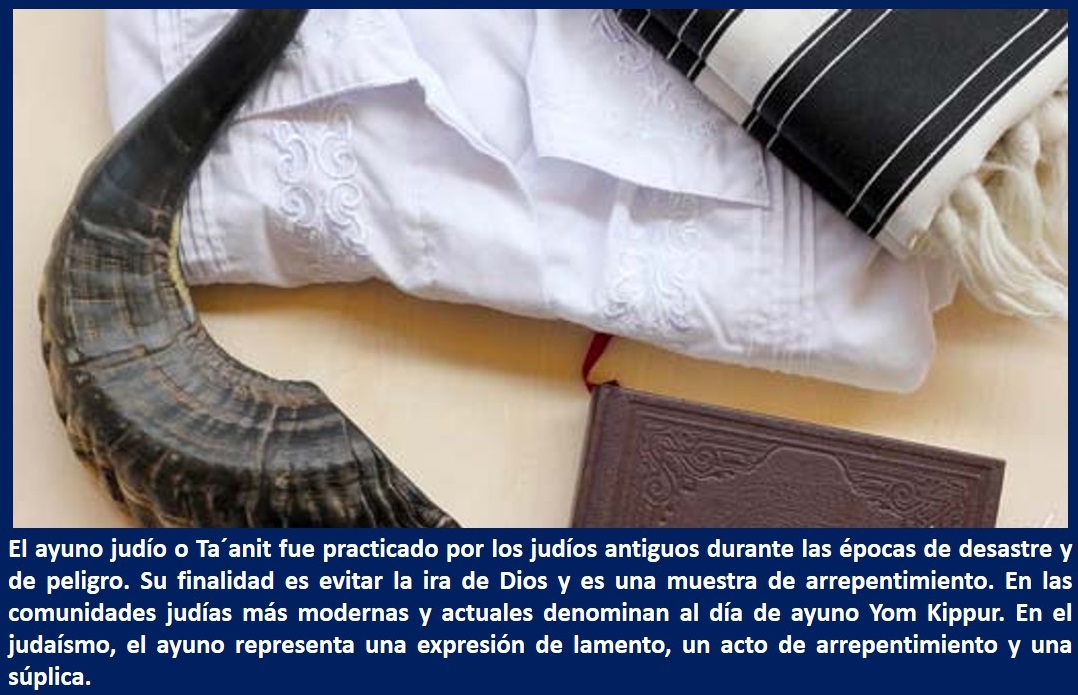The term Fast it refers to the action of abstinence from food and drink, but from the religious and spiritual point of view it is a way of approaching God to exhort his blessings. In this sense it can also represent the deprivation of some taste or delight.

fasting meaning
The etymological origin of the word fasting comes from the Latin root ieiunum which means empty. This same Latin root also gives rise to the terms jejunum and breakfast. The first corresponds to a part located very close to the duodenum, which received this name because when performing autopsies it was always empty. For its part, the word breakfast is composed of the prefix des that denotes negation or inversion, plus the word fast, referring to ceasing to be empty, after fasting overnight.
According to this, fasting is the action of the individual to abstain from all or some food and drink for a given time. There are different types of fasts and in the same way there are several reasons why they are carried out. Among the main reasons why people perform the action of fasting are the following:
- As a protest demonstration, in this case it is often called a hunger strike
- For health reasons, in this sense there are many therapies in both classical and traditional medicine that consist of fasting the body.
- As a spiritual means of drawing closer to God. This is the general purpose of the religious or spiritual type of fast, and may include not only abstention from food and drink. But it can also lead to the renunciation of some taste or delight for a certain period of time.
spiritual fast
Spiritual or religious fasting is one that is part of the religious traditions or cultures of human civilizations since ancient times. Proof of this is that the practice of fasting is noted in the following ancient religious texts:
-Upanishad: They are the sacred books of Hinduism and the oldest of them have an approximate date between 800 and 400 years before Christ
-Mahabharata: One of the most extensive epic-mythological texts of India, which according to historians place it in the third century before Christ.
-The talmud: It is a broad Jewish civil and religious code where the rabbinical debates on Jewish law, its traditions, customs, history, etc. are found. This text was written between the third and fifth century of the present era.
-The Bible: The holy book of Christians, the practice of fasting is mentioned in both the Old and New Testaments.
-The quran: It is the holy book of the Muslims, it is believed that at the death of the prophet Mohammed, his followers began the collection of his writings in the year 632 of the present era, until forming the complete text of 114 chapters.
Depending on the culture, religion or tradition, the act of fasting can range from abstaining the individual from eating food and drinks, to restricting himself from any taste, delight or pleasure, including sexual relations. It can also mean preventing the consumption of meat of animal origin, refraining from world news, or other sacrifice, either totally or for a defined period of time.
Some fasts allow a light breakfast which is often called parvedad. Term that comes from the Latin parvĭtas, -ātis, whose meaning is smallness. The following indicates what fasting consists of in each of the three Abrahamic religions.
The Jewish tradition of fasting
For Judaism, the Jewish New Year is celebrated in Tishrei, which is the first month of the modern Hebrew yearbook and, according to the order of the Bible, represents the seventh month. The first month for the Bible is the month of Nisan, in remembrance of the departure of the Hebrew people from Egypt.
Jews celebrate the new year between the first and second days of Tishrei. Torah law calls this celebration Yom Teruah and Jewish culture calls it Rosh Hashanah, which in Hebrew means head of the year.
During the celebration of the new year, what is known as Yom Kippur, which is the day of atonement or forgiveness, takes place among the Jews. This day has a great meaning for this culture. Since the fate of each person is decided for the year that begins after exposing conscience and repentance.
During Yom Kippur they perform sacrifices, as well as a series of customs such as: fasting in terms of food and drink, prayer, deprivation of physical pleasures, day of rest. All in obedience to God according to his command in
Leviticus 16:29-31:29 “This shall be a perpetual statute for you, both native and foreigner: On the tenth day of the seventh month you shall fast and do no work. 30 On that day propitiation will be made for you to cleanse you, and you will be cleansed before the Lord from all your sins. 31 It will be for you a day of complete rest, in which you will fast. It is a perpetual statute
Therefore, for the Jewish tradition, Yom Kippur is considered the holiest day of the year. For representing the expiation of sins and the reconciliation of the people with God for one more year. During the first and second days of the seventh month of each year, eating, drinking, bathing, sexual relations, all this is suspended for the Jewish people wherever they are. This annual fast begins at sunset on the first day and ends at night on the second day.
Jewish fasting in Babylonian exile
After the destruction of the temple in Jerusalem and during the exile of the Jews in Babylonian lands, the people established four days of fasting each year. These fast days were held on the following dates:
- The Ninth day of the fourth month of Tammuz, as a reminder of the day that the walls of Jerusalem were taken by the Babylonian troops
- Between the seventh and tenth day of the fifth month, as a reminder of the burning of the Temple of Jerusalem
- In the seventh month, in the new year
- On the ninth day of the tenth month, as a reminder of the day Jerusalem was besieged by the Babylonians. You can read about it in the Bible.
Zechariah 8:19: «Thus says the Lord Almighty: »“For Judah, the fasts of the fourth, fifth, seventh and tenth months will be a cause for joy and gladness, and lively festivities. Amen, then, truth and peace”
Jewish Personal Fast
Personal fasting is a common tradition among the Jewish people. In the book of psalms, the suggestion of personal fasting in difficult situations can be found on several occasions, an example of this is the following verses of the psalms:
35:13 (ESV) But I, when they were sick, wore sackcloth; I humbled my soul with fasting, and my prayer was repeated in my chest.
69:9-10 (PWB) The emotion I feel for your house is consuming me; I receive the offenses of those who insult you. 10 When I cry and fast, they make fun of me.
109:24 (KJV 1960) My knees are weak from fasting, And my flesh fails for lack of fat.
The following texts also refer to personal fasting:
- Daniel 9:3; 10:3
- Ezra 10:6
- Nehemiah 1:4
Islamic Fasting
Fasting in the month of Ramadan is one of the five main and mandatory foundations of the Islamic culture or Muslim religion. Ramadan is a celebration in memory of the first revelation of the Prophet Muhammad. The non-Muslim world associates the term Ramadan more with the Islamic fast than with the month. This month is the ninth of the Islamic calendar and can vary from year to year around the lunar change.
The help of the month of Ramadan lasts between twenty-nine or thirty days, delimited by the time between one crescent moon to another. And the daily fast is delimited by the rising of the sun until its sunset, during these days only two meals are made. The first meal is known as suhoor and must be done before dawn and is called suhoor. At the end of the daily fast, the second meal known as iftar is performed and is done in community groups of Muslims. Which meet to break the fast after sunset.
The month of Ramadan significantly alters the lives of Muslims, these days they live more at night. Just as the diet changes remarkably when preparing meals with a high energy intake. During these days of community fasting and obligation, what they call Sawāb or Thawāb, which are the spiritual rewards, multiply.
Therefore, Muslims not only prohibit the intake of food and drink, but also other types of pleasures that can be associated with sinful behavior. Thus occupying the hours of fasting in prayer or salat, reading the Koran, doing charity work in order to strengthen the pure and the conscience with their God Ala. In this culture personal fasts are also made during the year.
Conditions during Ramadan
As already mentioned, Muslims take sacrificial vows beyond abstaining from food and drink during Ramadan. To do so, the following conditions must be met
Start of the month of ramadan: Every Muslim must be aware of the beginning of Ramadan, which is the ninth month of the first quarter, and they must be attentive to see the first night of this event. If that night it was cloudy and you can't see the moon of Ramadan, you start fasting the day. The same is the case with anyone who has not been able to personally see the first moon of Ramadan and is confirmed by a trusted person, will begin fasting the next day.
The intention: Muslims must make a vow of intention the night before the first day of fasting, and so on, so that it can be valid. In the intention, the person must decide specifically and clearly what is the reason for fasting on that day, or for the month if he so wishes.
to refrain: During Ramadan you should refrain from eating any solid or liquid food. They can't smoke. They must be aware of the exact time that limits the time to eat with the time of abstention, if something is eaten during this time, the validity of the fast is annulled. They must also refrain from sexual intercourse, or ejaculation from masturbation in the period of hours of abstention. If one of these acts is carried out during the night, they must perform an act of ablution or washing before dawn.
Forbidden to induce vomiting: You cannot induce vomiting after eating any food. Only unintentional vomiting does not break the fast.
exempt persons: Ramadan is mandatory in Muslim doctrine. They may only be exempt from complying with it: Children, sick people, people who are traveling, menstruating and pregnant women.
What is Christian fasting?
Christian doctrine is derived directly from Old Testament Judaism, so Christian fasting shares some of the nature of Jewish fasting. Fasting is one of the spiritual behaviors that the Christian must perform to exercise his faith. This is a discipline that contributes to the strengthening of the spirit and therefore allows a more intimate approach with God.
Fasting allows the Christian the opportunity to voluntarily put his own flesh to death, giving priority to the spiritual and communion with God.
Benefits of fasting
The Bible says about fasting that God honors the Christian who does it sincerely and deeply. Because it is an act of humiliation in the eyes of God. Fasting accompanied by prayer leads the Christian to reconcile with the first love. That is agape love, the love of God, also bringing an encounter of greater intimacy with the Lord Jesus Christ.
Fasting and prayer give entrance to the Holy Spirit to show the true spiritual condition of the believer. Leading the believer to brokenness, repentance and therefore to a transformation of life. In this sense we invite you to enter this article of christian prayers for spiritual renewal, to be able to have a more direct communication with God, which allows him to renew and build his spirit.
So, everyone who considers himself a Christian must fast, whether personal or congregational, which are those indicated by the church as the body of Christ. Personal and voluntary fasting has its benefits, among them are the following:
- Helps to give character, polish self-discipline and obedience
- It allows the most intimate communion with God. Not only from the believer to God, but it is a spiritual certainty that he approaches those who humble themselves. Because as the flesh decreases, the spiritual grows.
- It is a form of worship and worship brings blessing
- Fasting strengthens and renews
- Through fasting victory is gained over any enemy.
Types of Fasting
The meaning of the word fast is the partial or total abstention from food or drink for a certain time. According to this you can have the following types of Christian fasts
- Absolute: They are fasts for short periods of time and consist of absolute abstention from all solid or liquid food, even restricting drinking water.
- Normal: Only water intake is allowed during fasting
- Partial: This is based on the fast of the prophet Daniel, in the Bible it can be found in Daniel 10:2-3. Certain foods are suppressed such as: Sweets, fruits, meats, wines and any food considered a delicacy. You can eat only legumes and vegetables.
- Medium: This fast is part time, usually six hours without eating any food, only water. More than anything, it is done by people who, due to health or physical condition, cannot perform the aforementioned. They are usually done in the morning.
In the bible verses of fasting
In the Bible you can find from the old to the new testament different quotes or texts that talk about fasting. Some of these Bible verses are listed below:
- Éxodo 34: 28
- Ezra 8:21–23
- 1 Kings 19: 8
- Nehemiah 1:4
- Esther 4:16.
- Salmo 35: 13
- Daniel 9: 3
- Joel 2:12
- Jonah 3:5
- Matthew 6:18 and Matthew 17:21
About the fast of the Lord Jesus Christ for forty days and forty nights, it can be read in the following biblical texts:
- Matthew 4: 2
- Luke 4: 1–2.
2 Corintios 4: 16 Therefore, we do not lose heart; Before, although this exterior man of ours wears out, the interior, however, is renewed day by day.
So through fasting the person and his spiritual senses are strengthened and developed much more.
The fast that pleases God
In the book of Isaiah you can find what is the fast that pleases God, in the passage of chapter 58, he says it very clearly, saying: That to stop eating to stop eating does not have any type of spiritual result and that It is not beneficial to stop eating or drinking, if you do not stop doing things that go against what pleases the heart of God.
Isaiah 58:6-10 (NIV):6 But it's not really like that! -The fast that pleases me- is that they free the prisoners chained unjustly, it is that they free the slaves, it is that they let the mistreated go free and that they put an end to all injustice; 7 is that they share bread with those who are hungry, is that they give shelter to the poor, clothe those who have no clothes, and help others.
8 Those who fast like this will shine like the light of dawn, and their wounds will soon heal. Before them will go justice and behind them, the protection of God. 9 “If you call me, I will answer you; if they scream for help, I'll tell them, "I'm here." If they stop mistreating others, and don't insult or curse them; 10 if you offer your bread to the hungry and help those who suffer, you will shine like light in the darkness, like the light of midday.
How to deliver a fast
When starting a Christian fast it is necessary to put an intention on it and deliver it to God in this way it is invoked for his blessings. In the same way, one must pray to understand the will of God. An intention may be to ask for work. For this you can read the prayer for me to do well at work every day.
Prayer to deliver fast:
O God the Father!
In this hour I ask you
Accept this fast that I present to you today
With this special favor that I ask of you
Listen and attend oh God
The prayer of this your servant
Always Lord I bring my wishes to you,
Supplications, requests and needs.
Grant me the grace of your blessing
Give me your favor and give me release,
wisdom and salvation
Lord allow the heavens to open
and provide the necessary resources
of the favor that I ask of you
Use the right people
touch their hearts
help me fulfill
The sincere fast that I offer from the heart
I accept above all your will
Because I know that your plans
They are better than mine
God, thank you for receiving my fast and for hearing me
thanks for what you do with me
I ask this in the name of Jesus,
Amen
Then I invite you to read another article that will also allow you to approach the Almighty through a prayer God help me I'm desperate and I can't anymore.





